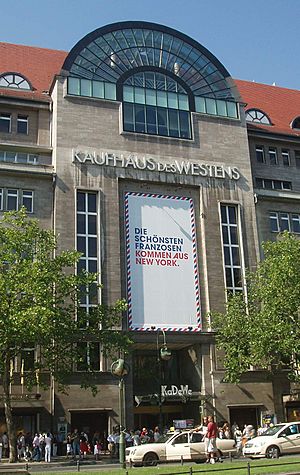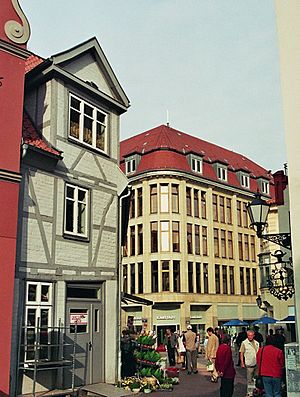Arcandor facts for kids
 |
|
| Public | |
| Traded as | FWB: ARO |
| Industry | Retail |
| Fate | Bankruptcy |
| Founded | 1999 |
| Defunct | 2009 |
| Headquarters | Essen, Germany |
|
Number of employees
|
68,000 (2005) |
Arcandor AG was a large company based in Essen, Germany. It was like a parent company that owned many different businesses. These businesses included mail-order services, internet shopping, big department stores, and even travel agencies.
Arcandor was created in 1999. This happened when two older German companies, Karstadt Warenhaus AG (started in 1920) and Quelle AG (started in 1927), joined together. In 2005, Arcandor had about 68,000 employees. Its yearly sales were around €15.5 billion. The company's shares were traded on the German stock market until September 2009. Some of its most famous stores were Kaufhaus des Westens (KaDeWe) in Berlin and a large Karstadt store in Frankfurt.
Arcandor faced financial problems and asked the German government for help. However, the European Commission said no to this request on June 3, 2009. A few days later, on June 6, 2009, Arcandor announced it could no longer pay rent for its department stores. These stores had been sold by the company earlier, and then rented back. On June 9, 2009, Arcandor officially filed for bankruptcy.
Contents
Company History
Karstadt's Beginnings
The story of Karstadt began on May 14, 1881. A man named Rudolph Karstadt opened his first store in Wismar, Germany. It sold fabrics, ready-to-wear clothes, and other goods. Just three years later, in 1884, a second store opened in Lübeck. Soon, Rudolph Karstadt had opened 24 stores across Northern Germany. In 1920, his business became a joint stock company. This meant it was owned by many shareholders.
Changes During the Nazi Period
When the Nazis came to power in Germany in 1933, many department stores faced big changes. Stores that were founded by Jewish families, like those by the Tietz and Wertheims families, were taken over. This process was called "Aryanization." During this time, KarstadtQuelle gained many new businesses and properties.
After World War II
In 1984, Karstadt expanded its business. It bought Neckermann Versand, a company that sold goods through mail order. Then, in 1994, Karstadt acquired another department store chain called Hertie. This chain included the famous KaDeWe store. Finally, in 1999, Karstadt merged with Quelle AG. The new company was named KarstadtQuelle AG. On July 1, 2007, the company changed its name again to Arcandor AG.
In June 2009, Arcandor officially filed for bankruptcy protection. This happened after the German government said no to its request for a large loan. However, on June 30, the government did agree to give a smaller loan to Quelle. In September 2009, Arcandor's banks sold its share in the Thomas Cook Group. This was done to help pay off Arcandor's debts.
In October 2009, the people managing Arcandor decided to close down the Quelle mail-order business. They had tried to find a buyer but were not successful. In September 2010, an American investor named Nicolas Berggruen bought the Karstadt business. This helped save it from completely closing down.
Arcandor's Businesses
Arcandor was involved in several different types of businesses:
- Physical Stores:
- Department stores: Karstadt, KaDeWe, Wertheim, Alsterhaus, Oberpollinger.
- Specialty stores: KarstadtSport (for athletic gear).
- Mail-Order Services:
- General catalogs: neckermann.de (known as Neckermann Versand until 2005), Quelle.
- Special items: Walz, Hess Natur, Madeleine.
- Other Services:
- Tourism: Bucher Reisen, Thomas Cook Group (Arcandor owned 52% of this company).
- Financial services: KarstadtQuelle Bank.
About Quelle Company
Quelle AG was a company that merged with Karstadt to form Arcandor. It was founded on October 26, 1927, by Gustav Schickedanz.
Quelle During the Nazi Period
In 1932, Gustav Schickedanz joined the Nazi Party. This allowed him to take over several large companies in the region. These companies were taken from their Jewish owners in the process called "Aryanization." By 1939, Quelle had about two million regular customers. It made 40 million Reichsmark in sales.
Quelle's Restart After the War
After World War II, the Allies stopped Gustav Schickedanz from working. His properties were taken, and he was sent to prison. He was released in 1948. While he was in prison, his sister, Liesl Kießling, managed Quelle. His wife opened the first Quelle store after the war in 1946.
Starting in 1948, Quelle began to rebuild its delivery business. During the process of "Denazification" for Gustav Schickedanz, it was found that about 7 million of his 9 million Deutsche Mark capital came from former Jewish owners.
See also
 In Spanish: Arcandor para niños
In Spanish: Arcandor para niños
 | Bayard Rustin |
 | Jeannette Carter |
 | Jeremiah A. Brown |




